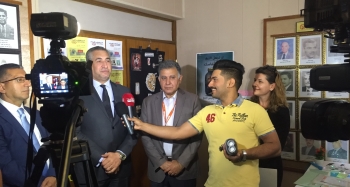Introduction
 Iraq’s Government has set up a multisectoral Crisis Committee in response to the COVID-19 pandemic. The Crisis Committee is formed from a number of ministries which collaborate closely to curb the pandemic. Iraq’s Ministry of Health is ramping up health awareness activities during this critical period. The Higher Committee for Anti-smoking at the Ministry of Health has developed an emergency plan, based on the MPOWER package, introducing activities for tobacco control in light of the current restrictions. The Higher Committee is focusing on three main areas within tobacco control: enforcing a ban on use of waterpipes in public places, creating awareness through campaigns, and combating illicit trade in tobacco products.
Iraq’s Government has set up a multisectoral Crisis Committee in response to the COVID-19 pandemic. The Crisis Committee is formed from a number of ministries which collaborate closely to curb the pandemic. Iraq’s Ministry of Health is ramping up health awareness activities during this critical period. The Higher Committee for Anti-smoking at the Ministry of Health has developed an emergency plan, based on the MPOWER package, introducing activities for tobacco control in light of the current restrictions. The Higher Committee is focusing on three main areas within tobacco control: enforcing a ban on use of waterpipes in public places, creating awareness through campaigns, and combating illicit trade in tobacco products.
Ban on waterpipes in public places
At the onset of the COVID-19 pandemic, in the first week of March, one of the first decisions of the Crisis Committee was to close down coffee shops, cafés and restaurants. This decision directly impacted on the use of waterpipes. The decision came in light of the current health conditions as well as in line with measures to prevent infection with COVID-19 especially in venues where people gather in large numbers. Security forces ensured that coffee shops, cafés and restaurants were closed, with restaurants providing delivery services only.
In conjunction with these efforts, security forces have clamped down on youth who are using waterpipes in public gatherings. The forces have dealt with the violators according to the Iraqi law of 2012 which prohibits the use of tobacco products in all forms including waterpipes in public places.
Awareness campaigns during COVID-19
Iraq’s Ministry of Health disseminated widely to the Baghdad Health Department and other health departments a publication by the World Health Organization (WHO) showing the link between tobacco use and the transmission of the virus and the severity of the disease that causes COVID-19. In turn, health departments in Baghdad and all Iraqi governorates printed materials, based on the WHO publication, to raise awareness to the public. They complemented this with field visits to markets and venues of gatherings as well as individual visits to raise awareness about COVID-19 prevention, protection and risk factors including smoking and use of tobacco products.
Iraq’s health radio and other international media like ‘Sawa’ radio hosted tobacco combat programme officials through interviews to raise awareness about smoking and COVID-19, within that the use of waterpipes was highlighted as a key risk factor.
Iraq’s Ministry of Health, in collaboration with WHO, celebrated World No Tobacco Day 2020 with a webinar using videoconferencing. The virtual celebration was titled “Protecting youth from tobacco companies’ tricks and preventing them from smoking”. The webinar, held on 30 June 2020, was attended by WHO experts and representatives from the ministries of health, education, electricity, petroleum, interior, finance (customs authority), planning and trade, youth and sports, communications, agriculture, water resources, higher education and scientific research, culture and tourism, in addition to a number of senior officials from various governmental bodies.
Combating illicit trade in tobacco products
Iraq is Party to the Protocol to Eliminate Illicit Trade in Tobacco Products since 2015. Iraq’s Ministry of Health, in collaboration with the Council of State, has established a committee to form a Central Authority to follow-up the implementation of the Protocol and to provide the legal support needed for its implementation. It is expected that the Authority will be formed from representatives of the General Secretariat of the Council of Ministers in addition to representatives from the Council of State and the following ministries: health, interior, finance (customs authority), planning and trade. The role of the Authority will be key to support authorities which are combating illicit trade such as the General Customs Authority which has seized a number of illicit trade products recently.
The Council of State has been a partner in drafting the new tobacco law— drafted in line with the MPOWER strategy and the Protocol to Eliminate Illicit Trade in Tobacco Products— in preparation to passing it onto the Iraqi Parliament.
Way forward
Iraq’s Ministry of Health Heads of Departments met using video conferencing to develop a plan to relax lockdown restrictions after Eid El-Adha. Part of this plan will cover tobacco control activities. It is expected that coffee shops, cafés and restaurants will continue to be closed even when lockdown restrictions are relaxed in future.
Iraq’s Ministry of Health Tobacco Combat Division is looking to continue its awareness campaigns and is searching for a young influencer or celebrity to participate in these campaigns.
Iraq is looking forward to having guidelines for Protocol implementation and to collaborating with its neighboring countries to enact the Protocol to Eliminate Illicit Trade in Tobacco Products through bi-lateral agreements. It is also looking forward to building on WHO’s technical and practical experiences with countries in implementing the Protocol. In addition, the Central Authority for Specifications and Quality Control is looking to introduce some changes to the Iraqi standard specifications for tobacco products. The changes, such as ensuring that the importer includes data on the country of origin, will help trace tobacco products more effectively.
Related links
General Customs Authority seizes a number of illicit trade products recently (Facebook post)
General Customs Authority seizes a number of illicit trade products recently (Facebook video)
Iraq’s health radio highlights the negative effects of smoking (Facebook)


